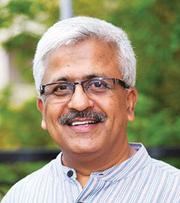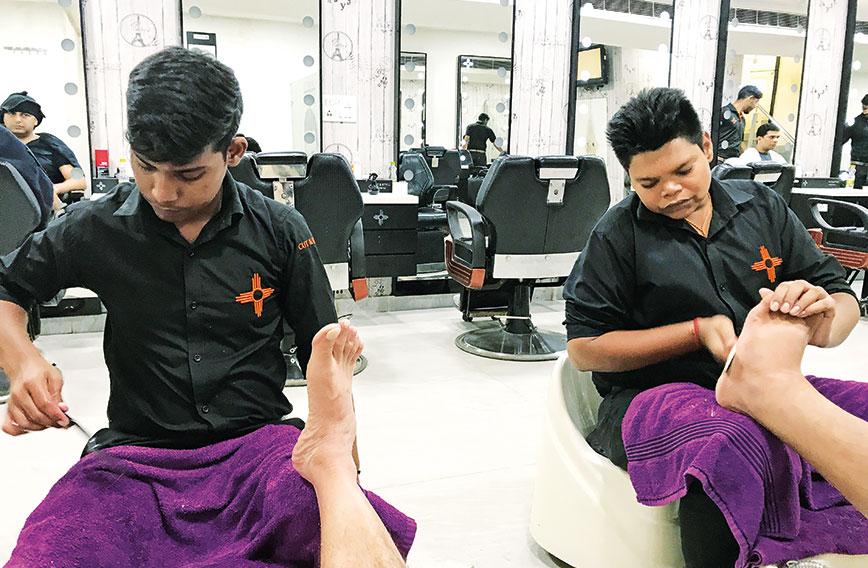
R BALASUBRAMANIAM
I first met Shivakumara when I got to travel in the cab that he was driving. It was around midnight and my flight had arrived late at Bengaluru airport. I finally got a cab after an hour’s wait. On the ride, I started to talk to the young man. I was curious to learn about what life had dealt him. He was a Bachelor of Business (BBM) student by day and a cab driver by night. He juggled between being the breadwinner of his family and pursuing his academic dream. Shivakumara had neither the time nor the patience to look to either the government or any NGO for support. He considered his desire for a better life and willingness to work hard for it his assets. He seemed to take life as it came and was happy that he had the opportunity to study by day and earn by night.
Earlier, I had a similar encounter with another cab driver. Imtiaz Ahmed had moved to Bengaluru from Mangalore more than 12 years ago and was working for a road laying contractor. When the professional hazard of working with bitumen caught up with his health, he decided to switch professions. Fortuitously, the world had opened up to the concept of aggregator taxis. He managed to secure a loan and got himself one. He had two daughters. One of them got selected for a medical course through NEET. Imtiaz could not afford her education in a private medical college which meant she had to explore alternatives. She wanted to work in the health sector so she opted to join a nursing course but secretly desired to pursue her medical studies someday.
Imtiaz worried about mobilising resources for her, desperately hoping that her dreams would not get quashed by his economic situation. He was quietly going about saving as much as he could and he continued to encourage her to take another shot at the NEET exams the next year. His second daughter was in Class 11 and dreamed of being a software professional. Imtiaz’s purpose in life was to ensure that both his daughters could get the education they dreamed of and deserved.
Compare this to another situation that left me confused and angry. The on-going air show meant disrupted schedules and several of us were waiting at the airport for our delayed flights. It was then that I overheard three young pilots working for a struggling airline talking amongst themselves. They were discussing the impending collapse of their airline and were considering jumping ship and exploring other options. One was lamenting that another airline was offering him a mere `2.3 lakh while he was already drawing much more. He was willing to join if he could negotiate more paid leave or days off with just the mandatory flying hours per week. It was laughable listening to their pressure points. They talked about whether the perks of being chauffeured around, the kind of five-star hotels offered during layovers and the class of lounge being provided were incentives enough.
As I thought of these disconnected incidents, I was left wondering how it was possible for people like Shivakumara and Imtiaz to move up the socio-economic ladder when life had so much stacked against them. Would only their hard work and enterprise be enough or do they need the ladder that society, NGOs and the government can provide? If so, what kind of support would they need? Should it be a dole, as many of our politicians are promising today, or should it be more facilitatory and ensure that their dignity remains intact?
Or, are the poor of India condemned to be denied opportunities that those up the social and economic ladder have access to? Thinking about Imtiaz and Shivakumara, I questioned whether where these pilots were in life was just the product of their own hard work. Were they not the direct recipients of the equity that their parents and families had provided them with? Why is it always easy for wealth to beget wealth? Was it an accident of birth that Shivakumara was born where he was while these pilots were lucky to be born in families that were likely living in cities and could afford to educate them and pay for their pilot training? What if Imtiaz’s daughter got to become a doctor? Would that change the way her children grew up and lived?
The real issue is not about the rich becoming richer but about creating opportunities for the poor to get out of poverty. Can we bring in an eco-system which builds the human and social capital of people in order to enable them to be productive and economically mobile? Should not the State and NGOs invest in such interventions rather than a myriad wasteful schemes that exist now? While schemes like MUDRA, Startup India and Standup India are good beginnings, the foundation needs to be investment in building human capital and the State providing its marginalised citizens with much needed social equity.
Growth and growth efforts should be inclusive and driven by a sense of fairness and justice. If India has to reduce economic inequality it will have to radically redistribute assets, institute land reforms, and provide universal healthcare, quality education, food security and social protection to all. Education and up-skilling of the labour force are crucial in building an egalitarian society. A more redistributive progressive tax system and transfer policy, ceilings on profits and executive incomes and the introduction of a luxury rate of value-added tax could help reduce income inequality.
Both the central and the state governments should bring in mechanisms to ensure good governance, reduce corruption, increase citizen engagement and social accountability in the delivery processes and avoid crony capitalism. The possibilities that lie in inheritance taxes and in taxing amounts received as bequests and gifts should be explored. The government should also conceive of programmes that go beyond merely helping people to cope with poverty to facilitating the poor to emerge out of poverty.
What India now needs is such a redefined social development agenda — a blueprint for social action that will eventually drive the economic engine of the country. Now that the elections are done and dusted, the government of the day has to begin this task with renewed vigour and far-sighted vision for a ‘New India’ to arise.
Dr R. Balasubramaniam, founder of the Swami Vivekananda Youth Movement, Mysuru, is a development activist and author. www.drrbalu.com
Comments
Currently there are no Comments. Be first to write a comment!




